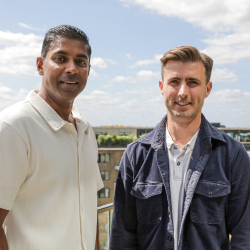Ahead of their annual party, we had a chat with Seedtag’s UK and Netherlands Country Manager, Paul Thompson, about the company’s progress, emerging trends in digital marketing and what contextual advertising can offer in the post-cookie world.
The interview has been edited for clarity and length.
Seedtag has had a very successful two years with acquisitions, year-on-year growth, new funding and release of new products. Can you talk about the company’s progress throughout the pandemic, both globally and in the UK?
Like every company, we experienced a bit of a slowdown at the beginning of the pandemic but things quickly normalised. I think it was pretty evident that digital in general did very well and within that subset, contextual was hot during this period.
I suspect that you’ll start to see a normalisation of people being able to spend, for example, on outdoor. But digital was 60-70% up in the UK, in terms of the space that we play in. So it was actually really good, and I think that was mirrored globally. Everyone found January and February quite slow. March returned to normal. By the end of the year, by Q4, which is obviously the most important part of the calendar for the adtech companies, was back to normal growth.
Now that we’re in perhaps the latter stages of the pandemic, what kind of changes are you seeing in your business?
I’m certainly seeing that there’s a lot of conversation around things like contextual and a post-cookie world. There are a lot of clients actively testing contextual vs. third-party cookie data. There’s a huge push towards meaningful metrics — trying to move away from clicks and other measurement tools into something more meaningful, like attention, which has a proper effect, rather than just trying to measure something because you can measure it. That’s definitely a big push there.
What emerging trends are you seeing in digital marketing?
There’s no getting away from it — TikTok has emerged probably over the last 24 months, but certainly over the last 12 months, as a runaway beast. There’s definitely been a shift away from Facebook and Instagram, just in a general sense. I’m not saying that there’s been a huge shift in terms of revenue, but in terms of people’s thinking as they start to look to other platforms.
There appears to be a bit of a trend around what transparency means. Within adtech, there are a lot of plot vendors taking slices of what you’d call working media. There’s been a few announcements recently, where people are looking at the supply chain from end to end, to see where the money is actually going and whether that money’s been deployed to add value, or to take money away from the vendor owner.
There have been a couple of big announcements around ethical media — supporting journalism as opposed to investing money on platforms. Having those direct relationships with publishers — again that plays to our strengths, because if publishers are working with us contextually, we help the publisher directly by monetizing their content and the audience that sits behind it.
I think everyone’s looking at sustainability as a subset of corporate social responsibility. But for the first time we’re starting to see clients ask us on a serious level: “what’s your carbon footprint?”
Diversity for the last couple of years has been big and actually very welcome. I think adtech, and advertising in general, has always been relatively good, but could do better. There’s been a lot of focus on bringing in women, ethnic minorities, and encouraging people from all walks of life and diverse backgrounds to come into entry level and graduate jobs. We’ve certainly been doing that ourselves.
On that note, as the industry gets ready for a post-cookie future, companies like Google are working on alternatives, but according to the critics none of them are quite good enough in terms of user privacy. What does contextual advertising offer, and do you have any predictions for which way brands will lean?
There’s no question that brands are shifting their ad budgets into contextual, because that’s where the growth is coming from. Clients suddenly realise that, actually contextual can do exactly what they have done historically with data they’ve collected – predominantly third-party data. I think there’s always going to be a case for first-party data. But where we sit in the spectrum of privacy is — we don’t collect any consumer data. Everything we do is based off the page, so we’re not storing anything, we’re not collecting any personal data and we’re not picking up data and then reusing it where you haven’t been given permission.
There was quite a big thing around consent framework, saying that actually it wasn’t fit for purpose. There’s a lot recently around mobile devices collecting your data and building a mega profile of you, based on things like your location, the websites you go on, all of those things.
I think there’s definitely a shift towards a more private web. Of course, Google will still hold all the cards, but Apple has done a lot around the conversation of what privacy should be. Third-party cookies on your browser — Apple got rid of those in 2017. The changes they made to the operating system in the April of last year means you can’t cross-match device IDs between apps. You can’t track people across multiple apps. I think that will benefit publishers, because the publishers will get paid for the audience they’re generating.
In terms of key things there’s probably three areas: first, clients getting to understand what cookies do and don’t do for them. Clearly there will be some measurement implications because it’s one-on-one measurement. There will be some implications around how you do frequency capping — so how many ads you see. But clearly something has gone wrong. I read an article the other day that suggested we see 5000 ads a day. Another article suggested 10,000. If you take a centre point and say it’s 7500 — that’s 8 ads a minute throughout your waking hours. Clearly too many.
I think there’s definitely an adjustment that needs to be made, and that adjustment is coming soon. Google pulled back from FLoC. Their removing third-party cookies is still being challenged in Germany, of all places. Germany was always first and foremost at the front and centre of GDPR and pushing those changes, but publishers there have said that they would still like to operate on third-party cookies. It’s still not a complete slam dunk that they’re going to go, but Google have now gone with Topics. I think Topics are a nice place to start, and we shall see where we end up.
Finally, what’s in the works for Seedtag in 2022?
More sophisticated contextual analysis — so a deeper understanding of what’s going on in the page. Really detailed, granular object recognition within images to build our human-like understanding of what’s going on.
Massive investment in creativity and creative ideation. Continuing to work with our publishers in a mutually beneficial way, and I think a lot of investment will go into data and insights. From us in the UK, we’re lucky because we’re leading the company push into attention. We worked with a company called Lumen. They’ve built attention models based on real world — so observing people actually looking at ads and how those ads are viewed, and trying to move away from what the computer says is viewable, or what people click on.
And then for us to educate the industry as well around — when people talk about third-party data, what were you really getting? Did you know what you were getting? How is it collected? There was a big thing recently about some of the other vendors in the market collecting without the consent of the publishers contextual segments, as well as brand safety. So that’s an interesting space as well — trying to educate people that we do it correctly.




























